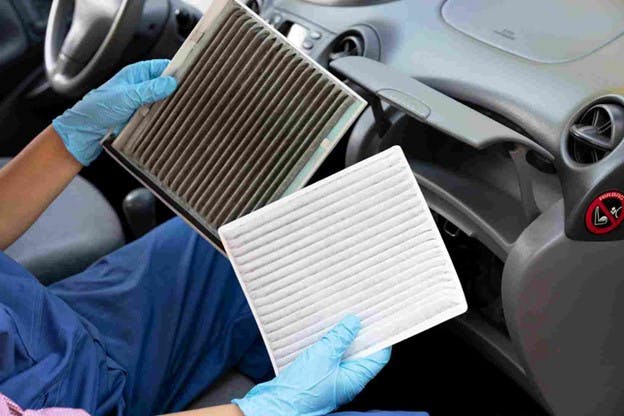Why should you replace your Cabin Air Filter?
Air Quality Maintenance in Milford, CT
At Colonial Toyota, we are experts in Toyota air quality maintenance in Milford, Fairfield, Westport, Norwalk, Danbury, Orange, Woodbridge, Ridgefield, Trumbull, Easton, Monroe, Bridgeport, Stratford, West Haven, New Haven, CT, and the surrounding I-95 corridor. We specialize in replacing Toyota cabin air filters with quality, genuine OEM Toyota parts. Our experienced service technicians can provide Toyota HVAC system care that maintains the cabin air quality and extends the lifespan of your Toyota’s heating and cooling system. Call for an appointment to test, repair, or replace your vehicle’s cabin air filter, and keep reading to learn more about why replacing your cabin air filter is so important.

Why Should You Replace Your Cabin Air Filter?
Your Toyota’s cabin air filter is a vital component of its HVAC system. The air filter keeps contaminated air out of your cabin and filters out harmful pollutants and contaminants. Proper care and maintenance of your cabin air filter will ensure it works properly, lasts as long as possible, and effectively protects you and your passengers from contaminants and allergens in the air. It's very important to follow the instructions in your Toyota owner’s manual regarding how often you should replace your cabin air filter. You should also be aware of the warning signs that your cabin air filter is clogged, dirty, or not functioning effectively. If you think there is a problem with your air filter, you should bring your vehicle in for a service appointment as soon as possible.
What Does Your Cabin Air Filter Do?
Your cabin air filter is responsible for filtering out contaminants, pollutants, allergens, and toxins that would otherwise enter your cabin. If these pollutants do enter your cabin, you could experience adverse health effects like asthma, allergies, respiratory issues, coughing, and other side effects from exposure to toxins and pollutants. The air filter is usually located behind your vehicle's glovebox. As air moves through your vehicle's HVAC system, it cleans the air and filters out contaminants and particulates that would be harmful for you and your passengers to breathe in. The filter has small pleats made from cotton and charcoal or carbon-based material. This allows it to effectively trap contaminants and neutralize odors before they enter the air that you breathe. If you suffer from respiratory issues like asthma, allergies, or COPD, it's very important to maintain clean air in your vehicle. The best way to make sure you have clean air is to inspect and replace your cabin air filter regularly.
How to Tell If There is a Problem With Your Cabin Air Filter
In general, experts recommend that you change your cabin air filter every 15,000-25,000 miles. However, if you notice a problem with your cabin air filter, you should replace it sooner. Many factors can affect the performance and longevity of your air filter, including the air quality in your area, the weather and climate, how often you drive, and whether you take long road trips. If you drive in congested urban areas or live in an area with high winds and/or poor air quality, you will need to change your air filter more often. You can also watch out for these signs it's time to change the cabin air filter in your vehicle:
- Poor, weak, or reduced airflow from your air vents.
- A strange noise like a whistling or squeaking from the cabin air intake ducts.
- An unpleasant odor like body odor, saliva, or mold coming from the air vents.
- A lot of noise when you run your vehicle’s heating or cooling system.
- An increase in asthma or allergy symptoms while in your car or not long after exiting your car.
- More dust in the air or a dustier interior.
- Noticeable changes to your vehicle’s indoor air quality.
What are the Benefits of Replacing Your Cabin Air Filter?
Regularly changing the cabin air filter in your vehicle will prevent pollutants from infiltrating your indoor air. The biggest benefits of replacing your cabin air filter are:
- Extending the lifespan of your vehicle’s heating and cooling system.
- Improving symptoms of allergies, asthma, and other respiratory conditions.
- Reducing the risk of exposure to car exhaust, pollutants, and other toxins.
- Reducing the workload of your vehicle’s HVAC system by preventing a clogged air filter.
- Increasing the efficiency of your vehicle’s heating and cooling system.
- Ensuring that you and your passengers are breathing in clean air while in the vehicle.
- Improve the airflow of your vehicle's HVAC system.
- Prevent foul and unpleasant odors from interrupting your drive.
Why Should You Only Trust Genuine OEM Toyota Parts?
Genuine Toyota OEM parts were designed, tested, and manufactured by the Toyota corporation. 'OEM' stands for original equipment manufacturer. OEM parts are designed to look and perform the same way as the part that originally came with your Toyota vehicle. Toyota OEM parts are rigorously tested to ensure they are safe and they will maintain the performance of your vehicle. When you use aftermarket parts or parts that were designed and manufactured by other companies, you might violate your vehicle warranty. You might also experience adverse safety and performance side effects. The biggest benefits of using OEM parts in your Toyota are:
- Compliance with your vehicle’s warranty terms and owner’s manual.
- Maintain the value of your vehicle.
- Prevent safety and performance issues.
- Maintain quality assurance.
- Guarantee that the part will fit perfectly in your vehicle and perform exactly as it should.
How to Maintain Your Cabin Air Filter
In addition to knowing when to replace your cabin air filter, you should also know how to maintain it. Cabin air filter maintenance can extend its lifespan and help it work properly. Here are some tips for properly maintaining your air filter in your vehicle:
- Regularly Check the Status of Your Air Filter – Locate your air filter behind the glove box or under the hood or dashboard of your vehicle. Remove the filter and check it to see how dirty or clogged it is.
- Clean Your Air Filter – Some types of cabin air filters can be cleaned a few times before they need to be replaced. If you have a paper air filter, it should always be replaced. A cloth or carbon air filter can be cleaned. Run the filter under cool, clean running water or a hose at low pressure. Rinse off any dust and debris. Then, fill a container with soapy water and submerge the filter for at least 10 minutes. Rinse it again until the water runs clear. The filter must be completely dried out in the sun (never in a dryer) so mold doesn't form. If you have already washed the filter two or three times, it is time to replace it.
- Follow the Recommendations In Your Owner’s Manual - Your owner's manual should offer advice on when it is time to change your vehicle's air filter. You should check the air filter every 15,000-25,000 miles; however, if you live in a dusty area or an area with poor air quality, you may need to change it every 10,000-12,000 miles.
- Changing the Air Filter—It's best to let a professional change your cabin air filter. They will install an OEM air filter and check and test it to ensure it fits correctly and is operating properly.
- Invest In a High-Quality Air Filter – If you have certain health conditions or respiratory issues or live in an area with very poor outdoor air quality, you might consider investing in a high-quality cabin air filter. More expensive filters offer better filtration capabilities and typically last longer.
Dangers of Poor Cabin Air Quality
Poor interior air quality in your vehicle can lead to health problems, allergies and asthma, worsening respiratory issues, and problems with your vehicle. When you let your cabin air filter get old, dirty, or clogged, you may experience some or all of these issues:
- Prolonged or extreme exposure to traffic emissions and pollutants like gasoline and diesel exhaust fumes, carbon monoxide, particulate matter, volatile organic compounds, and nitrogen oxide.
- Increased risk of respiratory conditions and illnesses like asthma, bronchitis, and pneumonia.
- Increased risk of toxin-related cancers.
- Elevated heart rate and blood pressure.
Schedule an Appointment for Toyota HVAC System Care
At Colonial Toyota, we specialize in new and used Toyotas for sale in Milford, Fairfield, Westport, Norwalk, Danbury, Orange, Woodbridge, Ridgefield, Trumbull, Easton, Monroe, Bridgeport, Stratford, West Haven, New Haven, CT, and the surrounding I-95 corridor area. Our Toyota dealership also has a service center where our experienced, certified technicians offer Toyota inspections, diagnostics, repairs, maintenance, collision repairs, and replacement parts. We only use genuine Toyota OEM replacement parts and accessories. Call us today or contact us online to make an appointment for Toyota HVAC system care. We will inspect your cabin filter, assess its pollutant filtration levels, determine your need for interior air purification, and recommend air filter cleaning or replacement. Our goal is to improve respiratory health by maintaining, repairing, or replacing elements of your vehicle's HVAC system.


